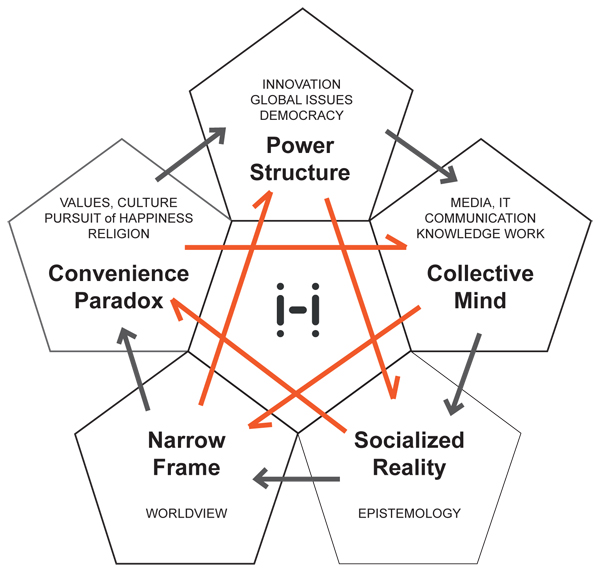Holotopia: Ten conversations
H O L O T O P I A P R O T O T Y P E
Ten conversations
Future democracy
The Cybernetics and the Future of Democracy conversation has the power structure insight and the collective mind insight as context.
If it is to be governable, cybernetics taught us, a system must have a certain requisite structure. How can anyone be in control—in a bus without steering, with candle headlights?
Future culture
The Ludens—A Recent History of Humankind conversation combines the collective mind insight and the socialized reality insight.
We have adapted to the complex world without vision, by simply giving up. While biologically equipped to evolve as the homo sapiens, we have culturally devolved as the homo ludens—who learns a profession as one would learn the rules of the game; and performs in it competitively.
Academia quo vadis?
The Academia quo vadis conversation combines the socialized reality insight and the narrow frame insight.
This is where the academic self-reflective dialog in front of the mirror takes place. Can science step through the mirror—and guide our society along a new evolutionary course?
The name of this conversation points to a parallel—with the hint that Jesus (in a vision) gave to Peter...
Future education
The Zero to One—Future Education conversation is in the context of the narrow frame insight and the convenience paradox insight.
In that context we may see why, as Ken Robinson pointed out, "education kills creativity": Education has evolved as a way to socialize people to think and act within the narrow frame.
The title of this conversation is borrowed from Peter Thiel's book, where it's intended to point to a certain kind of creativity. We know all about taking things that already exist from one to two, and to three and up to one hundred and beyond. What we need is the capability to conceive of and create things that do not yet exist.
Can we free education from its role of socializing people into a worldview, and re-conceive it to have "human development" as goal?
Future business
The Co-opt Wall Street—the Future of Business conversation takes place in the context provided by the Convenience Paradox insight and the Power Structure insight.
How can the holotopia overcome the existing power structure? No conflict is needed; we can co-opt the powerful!
The key is to see that the power of the powerful is an illusory one—only borrowed from the power structure, as compensation for services. The price paid is of course wholeness—both personal and systemic. It is the prerogative of power structure to make us pursue "power" against our interests.
The Adbusters left us a useful keyword, "decooling"; a decooling of our popular notions of success and power that is ready to take shape, in the context of those mentioned two insights.
How to put an end to war
The How to put an end to war conversation takes place in the context of the power structure insight and the socialized reality insight.
Alfred Nobel had the right idea: Empower the creative people, and the humanity's problems will naturally be solved. But when applied to the cause of peace, our creativity has largely been restricted to palliative approaches (resolving specific conflicts and improving specific situations).
What would it take to really put an end to war—once and for all? And to turn political strife into collaboration?
Gandhi and Arne Næss...
The largest contribution to knowledge
What might be the largest possible contribution to human knowledge? We converse about this theme in the context of the collective mind insight and the narrow frame insight.
An academic researcher may require uncommon courage to even consider the possibility that the great work she has published may have no social impact whatsoever—because the structure of our collective mind prevents impact. In what way will our knowledge and our knowledge work need to change?
It is not difficult to see why, in such circumstances, the systemic contributions to knowledge (improvements of the processes and systems by which knowledge is handled in our society) are likely to be distinctly larger than any specific ones. And that an even larger contributions will be the ones that innovate the systems and processes by which those systemic solutions are updated, and allowed to evolve further.
This conversation is about our knowledge federation proposal.
Religion beyond belief
The Liberation—The Future of Religion conversation has the Socialized Reality insight and the Convenience Paradox insight as context.
In traditional cultures, religion served to connect each person to a purpose, and people together into a community. Can a completely different idea of religion play a similar role in this time?
Can we put an end to religion-inspired hatred, terrorism and conflict—by evolving religion further?
Future art
The Future Art conversation takes place in the context of the Narrow Frame insight and the Power Structure insight.
Art has always been an instrument of cultural reproduction; and on the forefront of change. When Duchamp exhibited the urinal, he challenged the traditional conception of art. What comes next? What will art need to be like, in a world where our task is no longer to challenge the tradition—but to create an order of things that makes us whole?
The best kept secret of human culture
The best kept secret of human culture conversation is about the pursuit of happiness "between one and plus infinity"; it combines the Convenience Paradox insight and the Collective Mind insight.
All we know about happiness is in the interval between zero (complete misery) and one ("normal" happiness); but what about the rest?
This conversation is about the humanity's best kept secret: There are realms of thriving and fulfillment, beyond what we've experienced, or know about.
But the opportunity to develop them comes with a challenge—we must develop ways to federate the missing knowledge.
Could this be an answer to Peccei's call to action— to "find a way to change course"?

